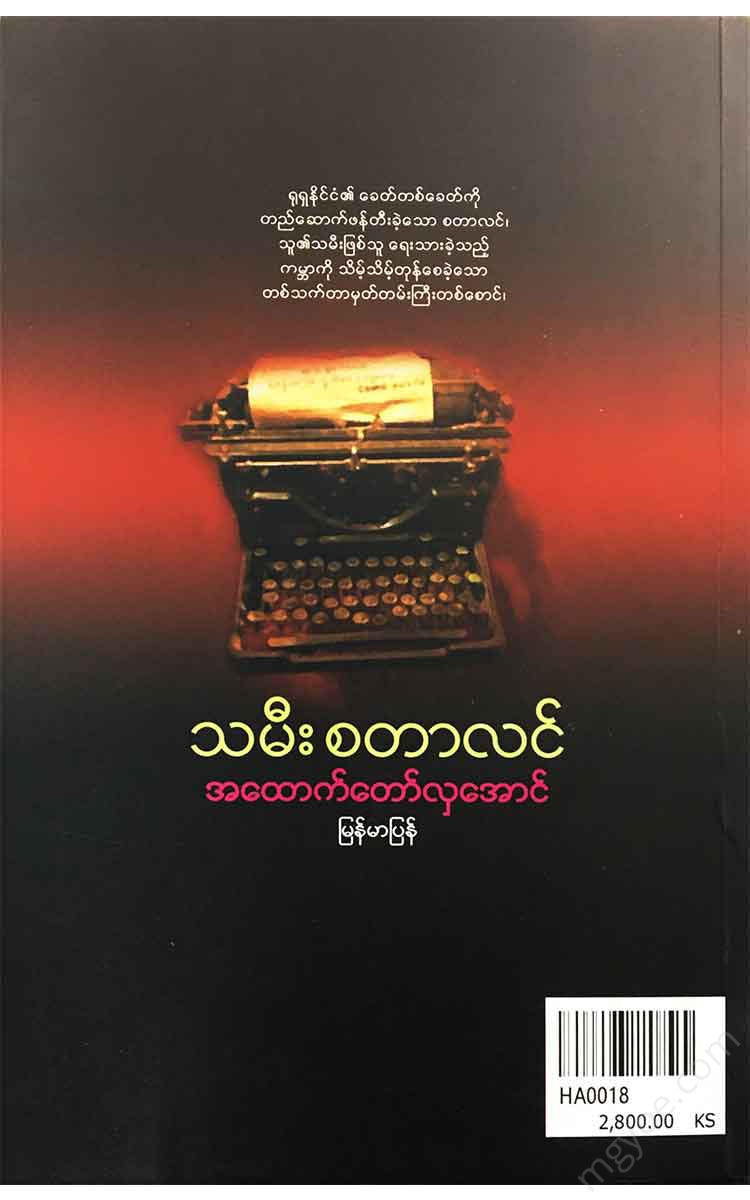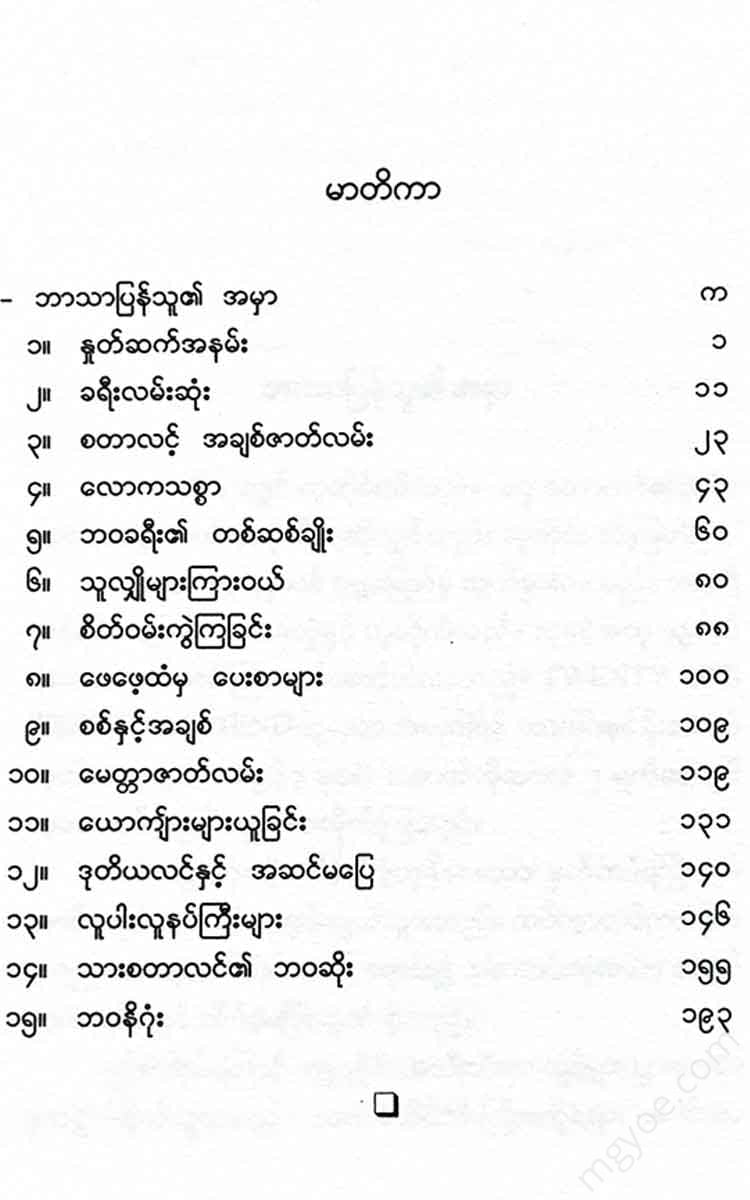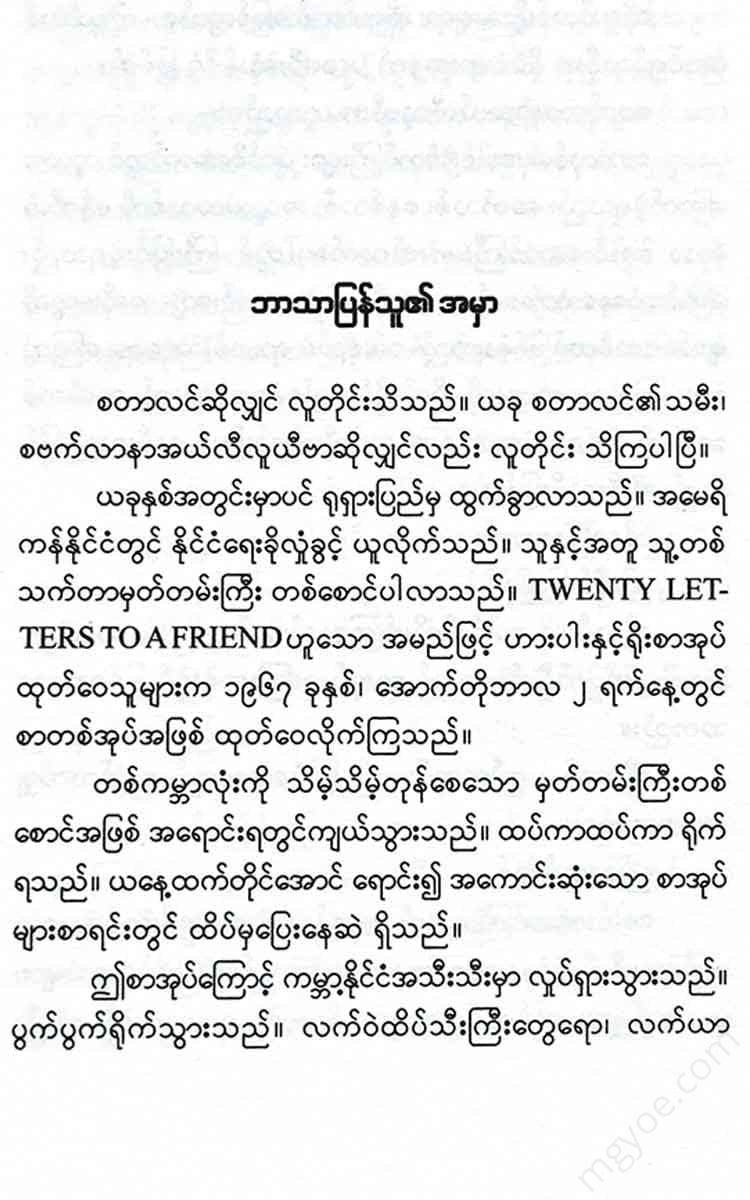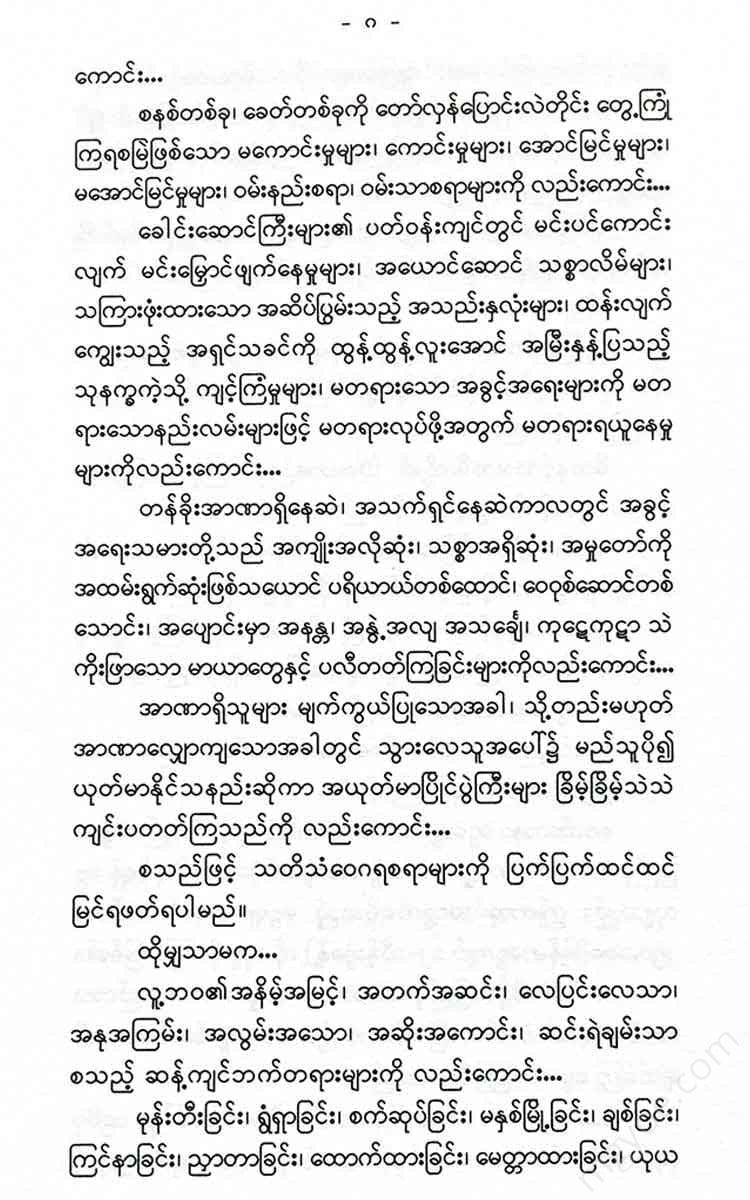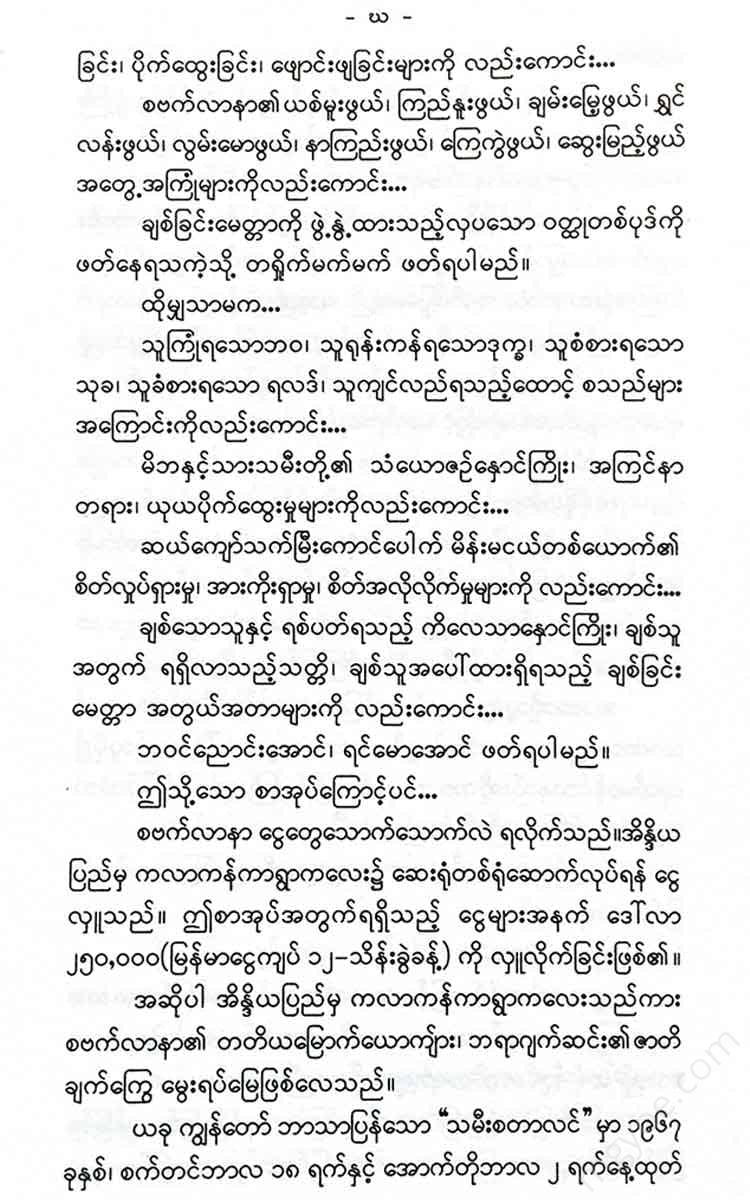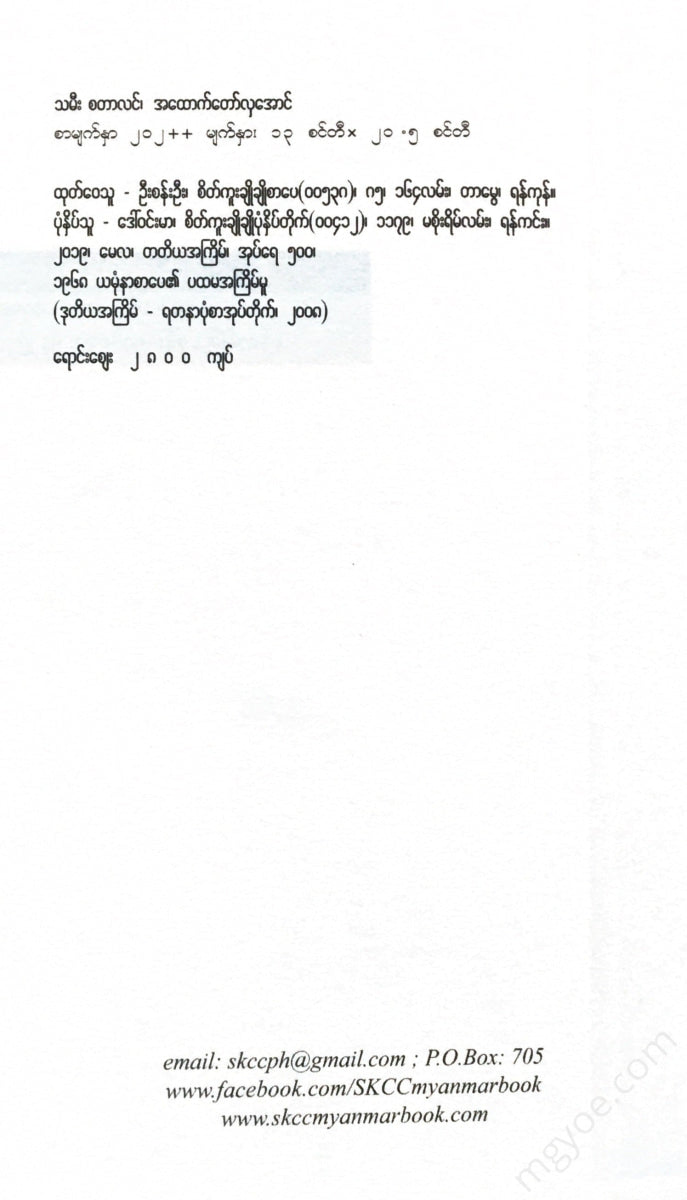စိတ်ကူးချိုချိုစာပေ
Athitaw Hla Aung - Daughter of Stalin
Athitaw Hla Aung - Daughter of Stalin
Couldn't load pickup availability
Goodbye kiss
In the village of Zhukovka.
The setting sun was shining brightly. The meadows and forests seemed to be covered with golden dew. They were like a small military camp outside Moscow, a place of joy and happiness. The streets and alleys had not yet been built. The government buildings had not yet been built. There were only lawns cut evenly with a machine. The short grass had been cleared away. It was as if a green carpet had been spread out.
People from Moscow come to this place to relax and unwind. For Moscow residents, it takes only 3 or 4 hours to walk around the forest. Even in that amount of time, you can breathe in the fresh air. You can breathe. You can wash away all the fatigue, all the mental and physical pain. You can gain strength. You can be reborn anew, you can become a new person. You can rest from all the heavy responsibilities of life.
A man from Moscow came to this forest. He spent three or four hours wandering around in the forest. He breathed in the fresh, clean air. Everything that had been tired of him had now come back to him. He had gained strength, he had become a new man. It was a short break from his duties. He returned to Moscow by electric train, which was decorated with streets full of people and cars, to the point of dazzling him. He took with him wild flowers. Wild flowers that had not yet come back to life and were withering away.
After a long time, he would tell everyone about the forest. On Sundays, he would suggest that they spend some time in the forest and relax. They would soon visit the forest.
They will walk on the sidewalks. And they will go beyond my house and the fences.
I have lived in this little forest in a corner of the world for 37 years (counting up to the year I wrote this in 1963). How have these differences shaped and shaped my life? How have these houses changed?
The forest has not changed to this day. It remains as it was before. The villagers are still drawing water from the well. They are still cooking rice and vegetables on kerosene stoves. The cows are still plowing, the roosters are still crowing, and the hens are still clucking. The village is still filled with the sound of cows and chickens.
But on the brown, low-slung rooftops, television towers can be seen. Young women are wearing Hungarian nylon dresses.
However, the meadows and the seasonally green forest still smelled and smelled of the sun. The golden pine trees were as they had been for many years. The roads to Petrovskoye and Znamenskoye were as they had been for many years.
This place, this region, is my land, my own. The Karen people I have lived in for (25) years are not my land, my region, or my own. Only when I come to this region do I feel free. There are fields there. I can see the sky all the way to the horizon. There is also a beautiful old church on the hill. It is an old church.
Yes. That temple is no longer used. They don't worship in it anymore. There are tall trees growing around it. They're blocking it all the way around. But it's still standing there, amazingly, in the green forest. It seems like it will prove a sign of goodness on earth until the end of time.
For whatever reason, I don't want to live in big cities. It's so suffocating in big cities. I can't even breathe the air, I can't breathe.
I don't want to be mistaken for someone who only looks after their own well-being and their own happiness. People in our time have lived better lives than me. It must be said that those who are five or six years older have had better things to do. They left the classrooms with fearless, unwavering courage and strength and marched straight towards war. Amidst the many dangers of life, only a few survived. In fact, they are the flowers of our time.
As for me, I have not taken on the great responsibilities that I should have taken on, that I should have taken on, that I have not carried on, that I have not stepped out on the world stage as a character, that I have not acted, that I have spent my entire life behind a curtain, unseen by the public.
Behind the curtain, which people cannot see, is only darkness and blackness. The audience at the Golden Festival cannot see him, but he sees everything.
The golden festival attendees were clapping their hands and rejoicing.
Speeches, voices, colorful lights, and beautiful scenery...
The person behind the curtain will be able to see in detail the characters who are performing their roles and roles as kings, as gods, as servants, as subordinates, as various forms of life.
His place was a place filled with the smell of rats, the smell of glue, the smell of rotten bark, and the smell of old decay.
However, the place is very beautiful and beautiful. It is very interesting. It is a place full of life and vision.
It is also the place where the makeup artists, the make-up artists, the dressers, the storytellers who, from behind the curtain, provide the characters with the words they have forgotten, live and work. Why are the characters dancing? How did they prepare themselves to dance? No one knows better than the person behind the curtain. No one knows better than he that life is like a vast theater.
I have danced a play,
The hearts of love and compassion are burning brightly. The heroes are wielding swords with a fierceness. The poets are reciting verses. The kings are wearing crowns.
Winter. The castles on the stage disappeared and reappeared in the blink of an eye. The fairies, the demons, the evil spirits, the evil spirits, the evil spirits flew away. The ghost of the king appeared. A small village was built on the stage. And then (according to Pushkin's instructions at the end of the play) everyone went away in silence.
I will tell you about the story of the little girl who was about to die. It was early March 1953. I was at my father's house at that time. I was watching over my father, who was unconscious.
These are frustrating, shocking, and painful days.
It was March 2nd. I felt as if the great earth, so stable, so immobile, so unyielding, was shaking beneath my feet. I was attending a French course at the Institute of Religious Studies and was studying French when they called me in. It was March 2nd, 1953.
“Malenkov called me to follow Blazhny,” they told me. (Georgy Malenkov became prime minister after Stalin’s death.) “Blazhny” is a Russian word meaning “nearby.” My father’s house in Kontsevo was called “Blazhny.” Kontsevo was on the outskirts of Moscow.
It couldn't have been Malenkov who called me out of the classroom like this. It couldn't have been someone else who called me. It had to be because my father asked me to call him.
I feel empty inside. I am stressed and anxious. I am restless.
We entered through the gate. The car parked outside the house. Krushak and Bulganin waved. I thought it was over, time was up. Krushak and Bulganin hugged me tightly. They were both crying. Tears were streaming down their cheeks.
"Let's go inside... Beria and Malenkov will tell you everything..."
Instead of the usual eerie silence in the house, everyone was running around excited, anxious, and scared.
Someone told me that my father had a stroke last night and was now unconscious. Hearing that made me feel somewhat relieved. I had thought that my father had died before he came to call me, so this comforted me.
At 3am they found my father in the room I was in. He was lying on the carpet. They decided to move him to the sofa in the next room where he was sleeping. They had already moved him to that room. The doctor was also in that room.
"You can go into his room," someone said to me.
The room was packed with people. I didn't know the doctors. Dr. Vinogradov, who had cared for my father for many years, was now in prison. The doctors who were now surrounding my father were very busy. They were very worried. They were in shock. They were taking blood from my neck and back. They were measuring my heart rate and taking X-rays of my lungs.
A nurse is giving a dose of medicine. A doctor is writing it all down in a notebook. A special meeting of medical scientists is being held somewhere. Another group of doctors are discussing in another room. A machine that can replace breathing in a research laboratory has been brought in and is ready to go. Along with the machine, some junior doctors have also come.
But... they don't know how to use this machine that can breathe a person. No one knows how to operate it and save a person's life. The useless machine is just standing there in the hands of those who don't know how to use it. The young doctors are moving around. Their attention is on the machine, with their backs to the patient. Everyone knows that trouble is coming.
In fact, they can be whatever they want in this room.
In that room, someone was moving in a disguise that was embarrassing to anyone who saw it. He was experiencing a kind of shamelessness, a shamelessness to the viewer. That person was Lavrenty Baria. (Baria was the head of the secret police, who was executed nine months later.) He was moving in body and mind. His face showed ambition, cruelty, cunning, and a lust for power. He was trying hard at the moment. He was pretending to be cunning so that he could be even more cunning in the future.
He went to the bedside. He stared at his unconscious face for a long time. His father would open his eyes from time to time. Every time he opened his eyes, Beria would stare at his father's eyes, which were filled with tears. He was the only one who was most loyal to Stalin, the most dutiful to Stalin, the most caring for him in body and mind. He had long and hard won a victory for us, so that we could all be in trouble.
The final minutes were approaching. The time for the end was drawing nearer. Finally, Beria saw me. And he gave an order.
"Let's take Svetlana somewhere else..."
There were a lot of people around. But no one moved, no one moved. A few seconds later, Beriya rushed forward in front of the people in the hall with a loud bang. The silence around the unconscious man was shattered. The sound he shouted was so loud and shrill. It broke the silence that everyone dared not even breathe.
"Khrustalev... take my car," he shouted. (Khrustalev was Stalin's chief of bodyguards.)
Beria was a master of deception. He was a master of deception. He was a master of deception. He was a master of deception. He was a master of deception. He could even convince someone like my father. He could make problems complicated. He won victories by convincing and manipulating people. He made his life great. My father was not a man who was easily trusted. But Beria managed to win over him.
Because of Beria, my father's name was tarnished. There were stains. Even in many good things, I was the main culprit along with Beria. Because of him, my father's name was ruined.
He used cunning tricks to deceive his father. He was cunning. He complicated many problems.
Now the ugliness that had been hidden in Beria's heart was coming out like a jar. He could no longer hide his deceit and wickedness. I saw all this. But everyone was afraid of him. Everyone was terrified of Beria's power, which was sharper than a sword. Everyone knew that the time when my father would die would be a time when no one in Russia would have great power and would be a time of neutrality. At such a time, it would be easy to get into trouble in a hurry. Beria could do whatever he wanted.
Dad was still unconscious. He couldn't speak. His right side was paralyzed, and half of his body was dead. Every time Dad opened his eyes, everyone leaned close to his face to look down. They wanted to hear him if he said something. They wanted to know if he wanted something.
I sat close to my father, holding his hand. Sometimes he looked at me. I knew very well that he couldn't see me. I kissed his face. I kissed his hand. I couldn't do anything more. I couldn't take care of him anymore.

